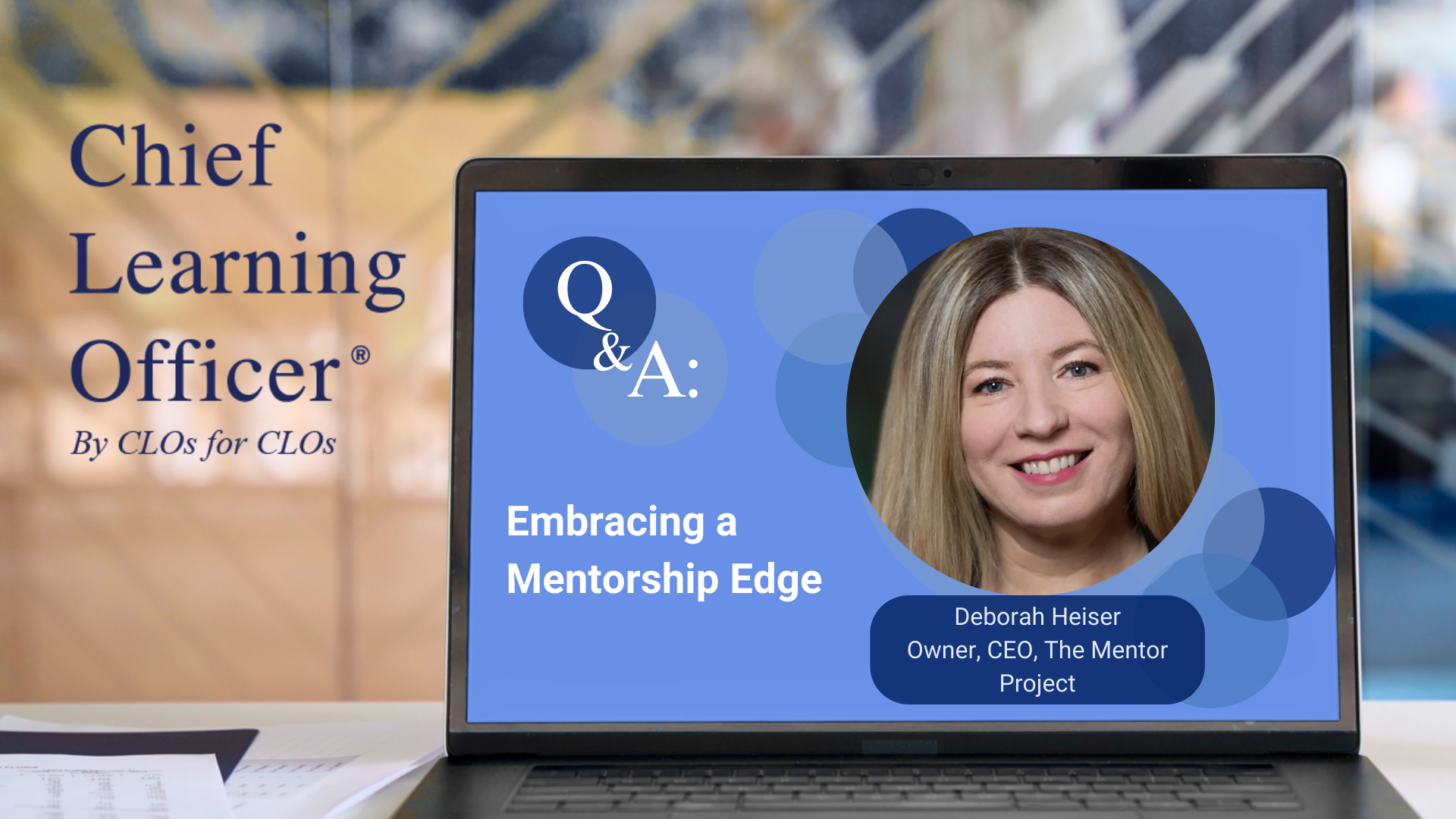On Tuesday, October 21, Dr. Deborah Heiser, applied developmental psychologist and CEO and founder of The Mentor Project, will be delivering a keynote at Chief Learning Officer’s flagship event, the annual CLO Symposium. She will be speaking about the power of mentorship and its ability to empower and foster transformation.
In the spring, I sat down with Dr. Heiser to learn more about The Mentor Project and its mission and her upcoming book “The Mentorship Edge.” Dr. Heiser also shared her thoughts on what a successful mentor-mentee relationship looks like these days, as well as its impact on the individuals involved.
Check out our conversation below, and consider joining us October 21 in Tucson to hear more from Dr. Heiser.
CLO: How do you define mentorship, and what role do you believe it plays in personal and professional development?
Mentorship plays a key role in our lives, and in a much bigger way than we imagine—both personally and professionally. It’s much more complex than what most of us think about. It isn’t a matter of connecting two people, it’s a complex interaction between the desire of a mentor and the person who’s mentoring to want to give back. It’s about being generative, caring for someone else without expecting something in return, having intrinsic motivation, where a person is not motivated by money or rewards. There has to be an actual connection between the two individuals in order for it to actually be mentorship.
Trust is another key component, as is goal-setting. Most people think “A mentor is just somebody who’s going to open doors for me, I’m not sure what they are, but I’ll have a door open.” But real mentoring is where you come in with a goal that you want to achieve, and that person who is going to help you has to really want to work with you to do that.
CLO: What are some characteristics of a successful mentor-mentee relationship?
A successful mentor-mentee relationship is one where the mentor and the mentee are both getting something out of it. Most of us think of the mentee as the person getting something out of the mentoring relationship, but the mentor also has to be someone getting something out of it.
Usually, that is when someone feels like their knowledge, expertise, values and wisdom is being carried by the other person. For example, if a mentor feels like they’re giving their information to someone, but that person isn’t doing anything with it, that isn’t a good relationship. Both parties have to be committed and get something from it.
CLO: What inspired you to establish The Mentor Project, and what is its primary mission?
We found high-level experts, from astronauts to innovators, who didn’t have access to mentees. They wanted to mentor, but there weren’t any mentees around. It was such a strange concept, because there were so many mentees looking for mentors. There was a big disconnect.
So, we started the Mentor Project with a couple of mentors who wanted to be able to give back, and we found out that there was such a need driven organically by mentors who wanted to be able to give back that we grew enormously quickly. Within six months, we went from ten to 60 mentors.
We’re now at the point where we had to put a cap on it. We grew so quickly that we now have a waiting list. We have mentors who would love to come on board and they’ll be able to, as soon as we can catch up to the explosive growth that we’ve had. Our mission is to bring world-class experts, the top one percent in their fields, to mentor students around the world for free.
We do this in primary school settings and university settings as well. These are one-on-one, in-group projects with schools, with classrooms. It’s online and in some cases in-person if the mentor can get there.
And no mentee, anywhere, pays. If a mentee wants to speak with an astronaut, they can do that and we really feel strongly that it’s important that every student has access to people who can help them, open doors or give them some insights into things that could change their lives.
CLO: Tell us about your upcoming book, “The Mentor Edge,” and what inspired you to write this book. What is it about?
I find that people misunderstand what mentorship is, and I wanted the word to get out that mentoring is everywhere in our lives. If we simply look to our left and look to our right, we’re able to find mentors in our everyday lives.
It might not be in the place where you expect mentorship to make the most explosive impact. It could be in places you’re not really thinking about, but mentoring is available to all of us. It can make an incredible impact on our lives. We can engage in it laterally, hierarchically, at work, at home.
We should have multiple mentors and people should be striving to become mentors—it’s a way that we can have our own legacy. The book highlights why we should be defining it properly, and why we should be looking to research to help us to get through it, not just anecdotes.
We also shouldn’t be looking at all of the urban terms that are used to describe mentorship because they are watering it down and taking away from the real impact and importance that mentorship offers us. If we use it so flippantly that we feel like we’re mentoring our dog when we walk our dog down the street, that can impede us from moving forward and actually engaging in mentorship for what it’s valued for, which is to open doors for the mentee: to inspire, to ignite impact and also to carry forth information that would have been lost otherwise from a mentor.
CLO: How do you see the role of mentorship evolving in the future, especially considering the changing landscape of work and education?
There’s going to be a flattening of the hierarchy. We’re used to seeing mentorship as a one-way street, up and down, and that you look up to find a mentor. But I think we’ll start looking to colleagues in other departments, friends, family and people we know who are at the same level, but experts in different areas. We may even seek mentorship from people outside our field.
Now that the online world has changed, I think mentorship is going to be similar to therapy. Therapy used to be strictly in-person, and now therapy is offered online in new ways. It may not be as effective as in-person, but I do believe that mentorship will follow the same route and that it’ll open doors for way more opportunities for mentorship. While I still believe one-on-one or in-person or even Zoom is much more optimal than having a bot or other online materials available to us, it’s still an improvement over what we had. I’m really excited about the future of mentorship.
CLO: Is there anything else you would like to add?
We should be looking at lateral mentoring as the way of the future, that we’re going to be looking at people to mentor us who are not our bosses, and who we don’t feel any worry or vulnerability about asking for help like we do oftentimes for someone who has a hold on our position or might have the ability to give us a raise or fire us. I do think that we’re going to start engaging much more frequently with lateral mentoring.
Deborah Heiser will be speaking at the 2024 CLO Symposium in Tucson, Arizona. For more information about speakers, registration and more, please visit our CLO Symposium website.















